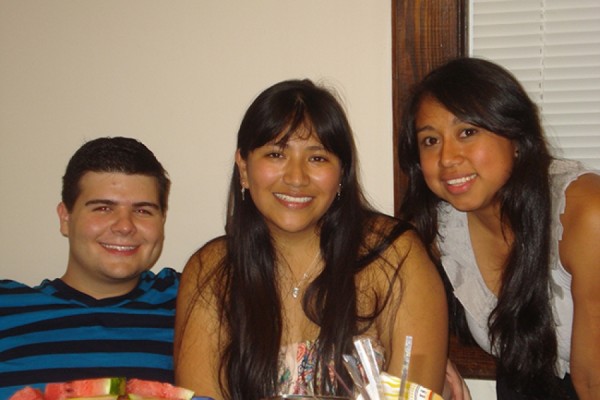
Addison Karnes, Noemi Juarez and HASCA President Yesenia Cruz Pascual. (Seaira Yearout/El Nuevo Tennessean)
Yesenia Cruz Pascual only knew about three other Hispanics on campus before joining the Hispanic American Student Community Alliance. She felt that not being able to interact with other Latino students was affecting her ability to keep in touch with her Spanish heritage.
“Since I only get to go home every three months or so, and I call my mom like once a week, I didn’t get to practice my Spanish very often,” said Pascual, president of HASCA at East Tennessee State University.
Anai Saucedo experienced the same lack of diversity. She said that before joining HASCA, she only knew one other person who spoke Spanish.
“Honestly before HASCA, I hated speaking with other Latinos because I didn’t know much about their cultures,” she said.
Pascual, being from Cleveland Tenn., and Saucedo growing up in Bolivia, are from two very different parts of the world, but still share that same legacy. Both have the urge to embrace it, and HASCA’s goal is to help.
“For me, it’s personal cultural exchange and the fact that it helps bring cultures together was my reason for joining,” said Saucedo, a senior at ETSU.
Pascual and Saucedo were informed about HASCA and like the majority of its members, saw an opportunity to start connecting.
“It was good for me to meet new people with whom I could practice my Spanish,” Pascual said.
ETSU graduate Ricardo Tapia and senior Christina Romero are the founders of HASCA. Its main goal is to bring the Hispanic and other communities together.
“I felt I had to do something to improve relations between both Hispanics and non-Hispanics,” Romero said.
According to the 2010 Census, 86 percent of Johnson City’s population is Caucasian and 4 percent are Hispanic. HASCA works to help non-Latinos learn more about the Hispanic community, its background, and traditions. Romero said in order to make a difference, a person needs to start small.
“Since my immediate community was ETSU, I decided to focus my efforts to campus,” she said. “HASCA has been able to bring valuable events such as Diversity Panel, Latino Cultural Celebration and Talent Showcase and Corazón Latino Festival.”
HASCA attempts to break down cultural barriers, which also helps fight any discrimination and prejudice one might experience.
“It’s not strongly in our face as it was for our parents’ generation, but it’s still here,” Romero said.
HASCA has focused on helping people learn about the differences in each other’s cultures, but that has not been the only aspect it has helped with. It has also assisted the Hispanic population at ETSU in coming together and becoming closer.
“We are not like other organizations where they get together once a week and do not have much contact other than meetings and may not even acknowledge each other’s existence outside the meeting space,” Romero said. “We are all friends in real life. We talk and hang out and if they have a problem, they know they can come to me and vice versa.”
Kelly Ortiz, secretary of HASCA and junior at ETSU, is another member who feels this organization has brought her closer with other members on campus.
“We all support each other, however and whenever we can,” said Ortiz.
The organization has not only provided a common purpose among its members, but it has also provided them with a feeling of love and acceptance within the community.
“Before joining HASCA, I felt like I was alone on campus,” Romero said. “But now, I feel like I am part of a family, like I am part of something bigger than myself.”
Since forming the club with Tapia in 2011, Romero has seen HASCA grow from five members to around 25 members, eight of those are from the non-Hispanic community. HASCA has attempted over the years to not only break barriers within the community but within the club itself by accepting all students of every background and culture.
“By limiting the club to only Hispanics, we are only benefiting us,” Pascual said. “We are a campus organization and we do want to expand.”
Romero hopes that as the new president, Pascual will help HASCA remain as an important part in the community and help the organization continue to grow and thrive.
“There are plenty of learning experiences that I have gained through events that other organizations have sponsored. Of course they were fun too!” Pascual said. “That is what I hope for our events. We want to share our vision and teach people about something new.”
_____
Editor’s note: This story was previously published on El Nuevo Tennessean.
